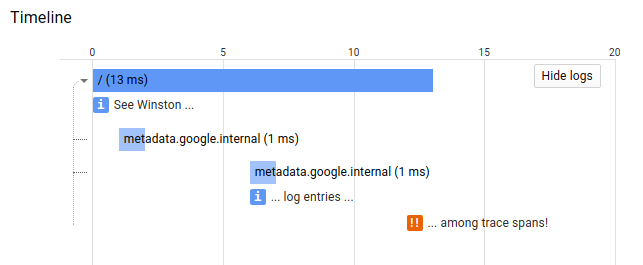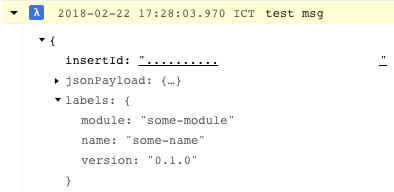This module provides an easy to use, higher-level layer for working with Stackdriver Logging, compatible with Winston. Simply attach this as a transport to your existing Winston loggers.
- Stackdriver Logging for Winston API Reference
- github.com/googleapis/nodejs-logging-winston
- Logging Documentation
Read more about the client libraries for Cloud APIs, including the older Google APIs Client Libraries, in Client Libraries Explained.
Table of contents:
-
Select or create a Cloud Platform project.
-
Enable billing for your project.
-
Enable the Stackdriver Logging API.
-
Set up authentication with a service account so you can access the API from your local workstation.
For a more detailed Stackdriver Logging setup guide, see https://cloud.google.com/logging/docs/setup/nodejs.
npm install --save @google-cloud/logging-winston
const winston = require('winston');
const Logger = winston.Logger;
const Console = winston.transports.Console;
// Imports the Google Cloud client library for Winston
// Node 6+
const {LoggingWinston} = require('@google-cloud/logging-winston');
// Node 4+
// const LoggingWinston = require('@google-cloud/logging-winston').LoggingWinston;
// Using ES6 style imports via TypeScript or Babel
// import {LoggingWinston} from '@google-cloud/logging-winston';
// Creates a Winston Stackdriver Logging client
const loggingWinston = new LoggingWinston();
// Create a Winston logger that streams to Stackdriver Logging
// Logs will be written to: "projects/YOUR_PROJECT_ID/logs/winston_log"
const logger = new Logger({
level: 'info', // log at 'info' and above
transports: [
// Log to the console
new Console(),
// And log to Stackdriver Logging
loggingWinston,
],
});
// Writes some log entries
logger.error('warp nacelles offline');
logger.info('shields at 99%');Any Error objects you log at severity error or higher can automatically be picked up by Stackdriver Error Reporting if your application is running on Google Cloud Platform. Make sure to add logs to your uncaught exception and unhandled rejection handlers if you want to see those errors too.
You may also want to see the @google-cloud/error-reporting module which provides direct access to the Error Reporting API.
To format your request logs you can provide a httpRequest property as part of the log metadata you provide to winston. We will treat this as the HttpRequest message and Stackdriver logging will show this as a request log. Example:
winston.info(`${req.url} endpoint hit`, {
httpRequest: {
status: res.statusCode,
requestUrl: req.url,
requestMethod: req.method,
remoteIp: req.connection.remoteAddress,
// etc.
}
});The httpRequest proprety must be a properly formatted HttpRequest message. (Note: the linked protobuf documentation shows snake_case property names, but in JavaScript one needs to provide property names in camelCase.)
If you use @google-cloud/trace-agent module, then this module will set the Stackdriver Logging LogEntry trace property based on the current trace context when available. That correlation allows you to view log entries inline with trace spans in the Stackdriver Trace Viewer. Example:
If you wish to set the LogEntry trace property with a custom value, then set a winston metadata property for 'logging.googleapis.com/trace', which is exported by this module as LOGGING_TRACE_KEY. For example:
const winston = require('winston');
const {LoggingWinston} = require('@google-cloud/logging-winston');
// ...
winston.info('Log entry with custom trace value', {
[LoggingWinston.LOGGING_TRACE_KEY]: 'custom-trace-value'
});You can specify labels when initiating the logger constructor.
// Creates a Winston Stackdriver Logging client
const loggingWinston = new LoggingWinston({
labels: {
name: 'some-name',
version: '0.1.0'
}
});
// Writes some log entries
logger.debug('test msg');
// you can also put some `labels` when calling the logger function
// the `labels` will be merge together
logger.debug('test msg', {
labels: {
module: 'some-module'
}
});The labels will be on the Log Viewer.
You can specify a prefix in the constructor, and that prefix will be prepended to all logging messages. This can be helpful, for example, to quickly identify logs from different modules in a project.
// Creates a Winston Stackdriver Logging client
const loggingWinston = new LoggingWinston({
prefix: 'some-module'
});
logger.debug('test msg');Samples are in the samples/ directory. The samples' README.md
has instructions for running the samples.
| Sample | Source Code | Try it |
|---|---|---|
| Quickstart | source code |  |
| Explict Auth Setup | source code |  |
This library follows Semantic Versioning.
This library is considered to be in beta. This means it is expected to be mostly stable while we work toward a general availability release; however, complete stability is not guaranteed. We will address issues and requests against beta libraries with a high priority.
More Information: Google Cloud Platform Launch Stages
Contributions welcome! See the Contributing Guide.
Apache Version 2.0
See LICENSE






